TheGoldenBlurb

Narcissus by Caravaggio, 1597–1599
"Eviscerate freely, dear readers …"
My maternal grandfather seemed taciturn. He'd speak hesitantly except to poke fun, which usually seemed more mean than humorous. I knew that he'd seen a lot in his time, but he rarely mentioned his experiences beyond a few hunting stories, which I found generally uninteresting. I wondered after his manner of living, for his whole lifestyle seemed cloaked and therefore mysterious. I wonder now how he introduced himself to strangers and I realize that he never properly introduced himself to me. I remember him but admit that I did not now him well. He seemed of a different age. I'd seen the photograph of him as a barefoot school kid, with his Huck Finn-looking compatriots, back when he attended a one room school, where he'd stayed only long enough to graduate third grade. His census record lists him as a laborer, though he owned his own home on a small plot of land featuring a barn where he bedded enough livestock to service the household, chickens, a cow, and a lamb or two.
I began writing in earnest once I realized that I seemed destined for a similar fate, bequeathing little of my manner of living to my grandchildren, for I was certain the generational mystery would very likely ultimately nullify me.
MendingNets
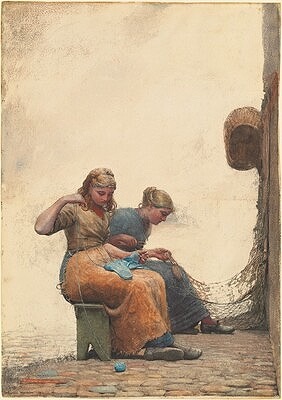
Winslow Homer, Mending the Nets, 1882
"When becalmed, mend nets."
I woke to the sound of my neighbor running a generator beneath his fifth wheel, a whale of a vehicle he surrounds with an annoying puce LED string when he parks on the street overnight. It provides just enough light to prevent anyone from plowing into it and just a tad to much for us up on the hill above to enjoy total darkness. Morning brings his predictable puttering, for he looks as though he and the missus will go camping this week, taking their whale up to some sprawling campground to, as they say, get away from it all. This morning brought a strange stillness, for the usual dawn winds failed to show up for work today. They usually get the conifer tops to tipping and whip around the aspen and cottonwoods, preventing any watering without wasting at least half of the precious water. This morning's dead calm, though, and it seems as though I'm missing a dimension. My usually animated world turned into a line drawing.
When becalmed, the fishing fleet would mend nets, for to idle away any day seemed tantamount to sin.
TheGooseberryMeditation

" … transcendent scratch scars which will hopefully never heal."
Gooseberries might be fairly characterized as a bear or a bitch of a berry, depending upon one's vocabulary. I consider them near the top of my long list of culinary delights, for I find them evocative beyond their own spare attributes. A hard, tart, unpromising fruit, they grow on thorny bushes which make them a bear or a you-know-what to pick, and once picked, they demand much from any devotee. Each tiny sphere comes with a stem and a blossom end, both of which must be trimmed to do anything at all with them. My mom used her fingernails, much as The Muse does to accomplish this end. I, possessing blunt fingers, employ kitchen shears to snip off each offending appendage. This effort makes painstaking seem downright cavalier, as each quart seems to take a year or longer to properly barber.
Convenience foods offer both much more and much less than simple convenience.
Shivility
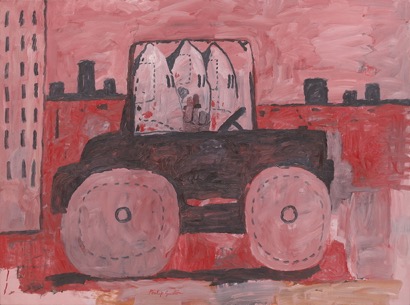
Philip Guston, City Limits, 1969
" … the one damned thing our Constitutional liberties do not provide."
Our melting pot seems to have become a caldron of complaints, our more perfect union defined more by its imperfections than by its inspiring aspirations, with innumerable factions, each presuming to speak for The People. Anything seems capable of sparking a fresh confrontation between passionate partisans and those they firmly believe represent some retrograde Dark Lord. Masks, strongly recommended by decent people dedicated to protecting public health, have somehow become tangled in notions of Constitutional liberty, as if protecting each other amounts to an unforgivable affront. The fabled Bill of Rights now seems the premise of an endless Bill of Wrongs enumerating endless infringements rather than encouraging civil consensus. Social Justice seems the new tyranny, as those harboring long-nurtured grudges forcefully demand a long-elusive equality, each advancement experienced as somebody's else's setback, producing a long, slow descent. Consent of the governed first requires some consent to govern by those to be governed, and no consensus seems likely to emerge. We've become an unruly herd, each seemingly dedicated to separate and inherently unequal interpretations of our common creed.
Civility cannot be insisted upon.
Accschleptance
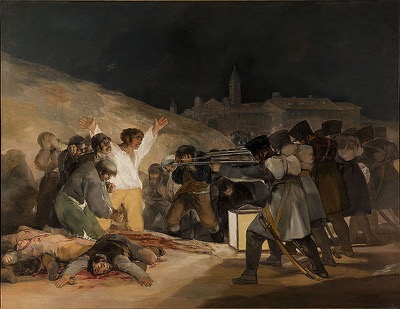
The Third of May by Francisco Goya, 1814
"the first great picture which can be called revolutionary in every sense of the word, in style, in subject, and in intention". Kenneth Clark
"The world changed. I haven't completely kept up."
Acceptance of the NowHere seems a first step, not a final one, for any fresh acceptance will likely appear clumsy, more of an Accschleptance than a flawless integration. This seems a cruel joke, for once surviving the denial, anger, and bargaining before achieving a point where acceptance might prove possible, the cycle seems to simply start all over again with acceptance. An exhausted acquiescence might best characterize the first taste of this sort of success, more surrender than embrace. However such changes occur, they're unlikely to show anyone performing at their best. You'll be several songs into the new set before the sound check's really completed, and until then, any early audience should properly feel initially disappointed. Later some mastery might emerge. Maybe.
This first week of Summer included the tail end of Spring, a transition for both seasons and my blogging themes.
EasingInto
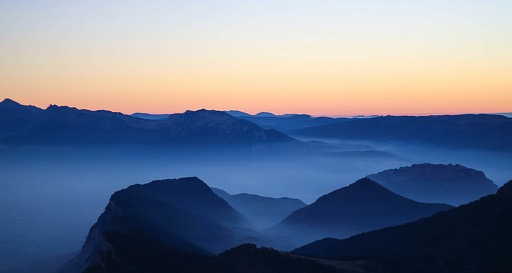
"I dream of my own dominion while denying myself, as well."
I start my summer days slowly, waking early to waste the first few hours in a dark house gazing out into darkness. I wear a jacket, not wanting to waste an ounce of furnace fuel warming up space I'll later be desperate to cool. I step out onto the driveway to spy whatever satellite might be passing by and quietly curse the neighbor's paranoid night lights. They fear prowlers though their neighbors would just as soon somebody hauled their immobile vehicles somewhere far away where we wouldn't have to watch them rust all day and night. I suppose that I'm an annoyance to my neighbors, too, for I semi-scrupulously maintain my yard, which I do not consider to be hard work, just necessary, but in mountain communities, yards tend toward the natural, left as is, weedy and imprecise. We each display our vices, often proud of our attributes and unaware of the quiet rebukes our presence provokes. The Predawn slips like velvet across my face.
I feel master of this place in the wee, small hours.
Gruel

The disreputable cook from Geoffrey Chaucer's Canterbury Tales, the Ellesmere manuscripts, c. 1410.
" … fills me up without much fuss."
My earliest culinary successes came long before any literary success arrived, indeed, back when I was still essentially pre-literate. I'd read very few books by then and found reading tedious. I relied more upon my instincts then, rarely referring to any authority before undertaking a new activity. Cooking had long interested me, but my mother was no chef. My early influences included the Cub Scout Handbook, which illustrated how to boil water over a campfire. Once out on my own and poor, I learned through sad repetition how to make supper. A friend had gifted us with an enormous cylinder of a spongy protein powder athletes use when training, and I took to incorporating that stuff into darned near everything. Most of my meals amounted to naive inventions, eatable after a fashion, but rarely choice. The mysterious powder became the primary ingredient in what I called Giant Cookie Muffins, which resembled neither cookies nor muffins, but which carried more protein on board than the typical cattle boat. They were chewy to the point of spongy, and very, very curiously textured. You've probably never eaten anything even remotely like them. I also baked bread in empty coffee cans, having no proper bread pans, and I can confidently report that it always smelled like freshly baked bread, if not always tasting precisely like it.
I made many crude casseroles in those days, dishes which could serve as breakfast, lunch, or dinner, and often did.
Procrastidestination
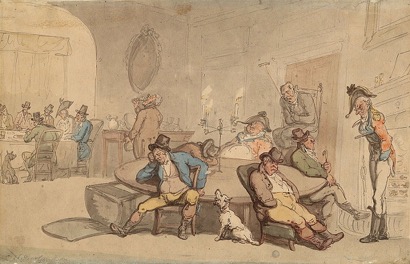
Scene In Club Lounge by Thomas Rowlandson, 1798
"A time will come, or not, …"
It seems to me that some days were not created to be seized. Procrastination has its rewards, not necessarily as a chronic form of engagement, but as an especially savory sort. I find wearying our long collective obsession with efficiency, for it seems to me that not every frog demands to be eaten at the beginning of every day. Some seem to beg for some contemplation, or even some strategic distraction, perhaps a clever tactical delay. Those observing might well diagnose procrastination as if that were a serious disease, and prescribe decisive action for relief, but I often find great relief in delaying an engagement, improving ultimate satisfaction that way. I seem to need to cogitate my way into some actions, for I sometimes waste my effort by simply jumping in before, for instance, determining the depth of a pond. Furthermore, few satisfactions seem to rise to the level I experience upon completion of a task I've long, or even overly-long, shirked. Plus, in those situations, I feel as though I've achieved on my terms, not the damned clock's.
Some of my forebears were strict Predestinationists.
Irrevocableution
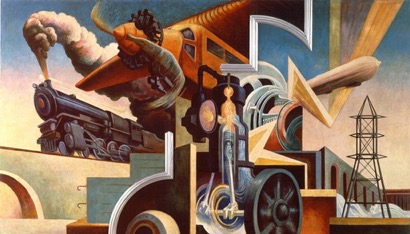
Instruments Of Power by Thomas Hart Benton, 1930-31, from his America Today Murals
" … while this fresh-faced image in this brand new mirror wonderingly gazed back at me."
Some say that biological evolution works only over large scales of time, but I do not believe this assertion, for my own biome seems to have been in continual transition since the day I was born. I might have been evolving daily, scaling this or that feature, never once static. I look for my reflection in my morning shaving mirror and often stare startled into that image peering back, for I cannot remember before seeing anyone precisely like that imposter staring back at me. The hair's at a different angle. The eyes slightly sunken. The nose somehow wrong. Sure, I always find at least a passing resemblance, but I'm increasingly moved to wonder why I even try to find myself there, or more precisely, why I try to find any self I might immediately recognize. I might better serve my self-esteem should I inquire rather than peer into mirrors, trying to see who I might be NowHere, rather than attempting to catch glimpses of whom I should already understand was already a past self. No man shaves the same face twice.
My old reliables either betrayed my faith in them or were never all that reliable in the first place.
NowHere
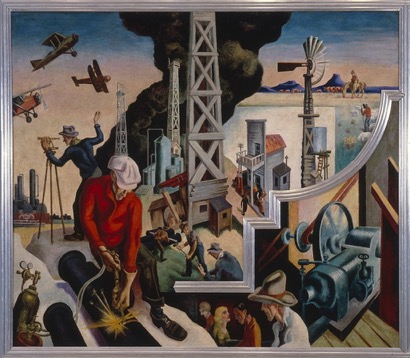
Changing West, one of ten America Today murals by Thomas Hart Benton, 1930-31
"Even if this Damned Pandemic never recedes …"
I went to bed last night in the there and then. Pandemics have a way of simultaneously propelling one both backward and forward. Backward into longing for how it once was and forward into hopefully pining after how it might become. Meanwhile, one remains steadfastly in the NowHere, a most curious terrain where, depending upon capitalization, it might seem indistinguishable from nowhere or a stunningly present NowHere. The longing and pining too easily become heart-bruising pushes and shoves since both objectives remain steadfastly out of reach regardless of effort expended. For short periods, longing and pining might produce some reassuring respite from any sudden, shocking trauma, but neither serves well as a lifestyle, and both in concert seem certain to result in a sort of skitzy-paranoia serving nobody well, a form of self-destructive denial. However far anyone might long or pine, they remain precisely NowHere.
When will this pandemic end? Likely not in our lifetimes.
RaggedEndings

Achelous and Hercules, Thomas Hart Benton, 1947
"Resolution was never anything but a dream."
We all learn early how stories are supposed to end, with loose ends all tied up, signaling resolution. The novel, once unknown and new, becomes experienced and thereby old. A few, we'll refer back to again and again, not to rediscover any ending already known, but perhaps to re-experience the style and craft of the storytelling, the satisfying phrasing and deft plotting. These stories might never properly resolve, for though we do learn that the butler did, in fact, do it, that knowledge quenches nothing, but sometimes encourages a longer, perhaps life-long engagement with this author and his prose. But that describes the book world. Out here in what passes for the real world, RaggedEndings tend to be by far the most common form of resolution, where though not completely done, one must eventually simply move on. Time and tide and all that.
The last day of Spring, just over a half of a day this year, finds me surrounded by unresolved WhatNow? Stories.
Commtroversy

"I came from The Never Can Say Goodbye Family …"
When my ninth great grandparents left England in 1637 for what would one day be called Connecticut, they broke communication with everyone not traveling with them. They spent weeks in total isolation from even land, then years before receiving any word from anyone they knew in their former home country, and then, that communication relied upon writing and paper or long-delayed word-of-mouth. Direct connection with home folks became indirect Commection, and would remain so for the rest of their long lives. No letters survive, and, indeed, letters might have never been sent, for no reliable postal service would emerge for more than a century. Messages might take months to move between what would eventually become colonies and their former home country, and not all ships safely made the crossing. Some messages were doubtlessly lost in transmission. Aside from their charter governing the terms of their obligations to their backers—for they were perhaps more capitalists than Pilgrims—they were truly on their own.
In those times, face-to-face communication fueled the vast proportion of human connections. They talked.
NDA

A votive plaque known as the Ninnion Tablet depicting elements of the Eleusinian Mysteries,
discovered in the sanctuary at Eleusis (mid-4th century BC)
"I pray that ours won't hang around for anything like a hundredth as long."
The modern organization is fundamentally indistinguishable from a cult. It perceives its secrets as its primacy, and self-importantly considers everything it does a proprietary secret. It expects employees as well as visitors to sign the cheesiest of legal documents, the holy NDA [Non Disclosure Agreement], a contract of truly questionable authority threatening severe penalties should the signer even inadvertently spill any beans. Some of these 'agreements' also insist that anything an employee or visitor utters inside automatically becomes the sole property of the proprietor without even a distant mention of compensation for that creation. These are privileged reprobates concerned first with dominion. These questionable contracts are agreements in name only, standing more accurately as coercements, my-way-or-the-highway insistences rarely open for negotiation. If a vendor, contractor, or employee doesn't like the terms, they're perfectly free to lump it. Period.
Later, when asked a straightforward question, a disgruntled ex might legally refuse to answer by claiming their speech stifled by a prior agreement.
Fatigue

Hercules Fighting Death to Save Alcestis by Frederic Lord Leighton (1869-71)
" … when Fatigue wins, everyone loses."
The front line personnel complain of Fatigue, the constant mind-numbing companion of prolonged engagement. The Fatigue enters unnoticed, while the host focuses upon tasks at hand. Standing back, though, a wave of exhaustion washes over, astounding. How could I not have noticed? Fatigue brings no excuses, though, for even more of the same awaits and relievers seem just as scarce as does time. Diving back into the fray, distinctions like night and day lose meaning. Like an engine, one seems to run much longer on empty than when nearer full. A definite pull discourages disengagement. Beyond tired, fresh space appears where energy and fear forfeit their former influence. One becomes a machine repeating practiced motion and preconscious skill. Someone's likely to have to pull you off your work. Only then might real weariness settle in.
Doctors, nurses, and EMTs know Fatigue better than do you and I.
FourHoles

Earth, Giuseppe Arcimboldo, possibly 1566
"It might not say anything about me or my overblown prowess …"
The oldest political advice counsels that if your opponent's busy digging a hole, stand aside, but what to do when you catch yourself digging one, or, as in my case, find myself engaged in digging four holes? I imagined each a modest effort, though I knew the substrate beneath that flowerbed. I was building a defense against the bastard deer, who, around here, put self-respecting omnivores to certain shame, for they eat anything, everything, even prickly gooseberry shrubs and rhubarb leaves, which by international decree have been recognized as deadly poisonous to all species since at least the early Middle Ages. I'd moved my circular wire fence from my rhubarb bed to enclose the gooseberry garden after The Muse had spotted the expletive deer gnawing my beleaguered bushes, thinking that now that the rhubarb's well established and lush, the deer wouldn't be in any rush to assault it this year. Once I'd moved the barrier fence, the deer mounted armed assaults against the rhubarb, stripping every leaf from every stalk, gratefully avoiding the edible stalks, which The Muse made into a custard pie, but the damage was done. I'd need a better barrier for the gooseberries once I moved the rhubarb's original protective fence back where it apparently belongs.
Hence, the holes.
ShelfControl
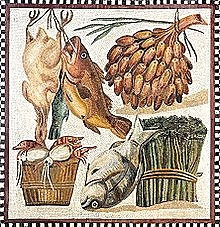
Still life on a 2nd-century mosaic, with fish, poultry, dates and vegetables from the Vatican museum
"A decent pot of beans will last through a week of breakfasts and lunches if you're not too picky."
Three months ago, when the stay-at-home directives hit, you could be excused if you thought that few people had ever put much thought into the idea of maintaining a pantry. City dwellers have always struggled with shortages of shelf space counterbalanced with a choice of corner bodegas and convenient restaurants. Country dwellers have always maintained some cellar space for what they euphemistically referred to as canned goods, and many maintained more than one refrigerator and even a supplemental freezer or two or three to sustain a sense of self-sufficiency. When it's ten or more miles to the nearest store, an inconvenience market primarily selling gasoline, one quite naturally stockpiles and makes do. The professional class tended to eat out more frequently, daily lunches and a couple of suppers out each week, while the working class might have more frequently brought their own bag lunch and made their own suppers at home, often after a quick stop for that evening's ingredients on the way back.
But the stay-at-home directives disrupted these rhythms, forcing folks to suddenly attend to more than than just the meal before them.
Ministration
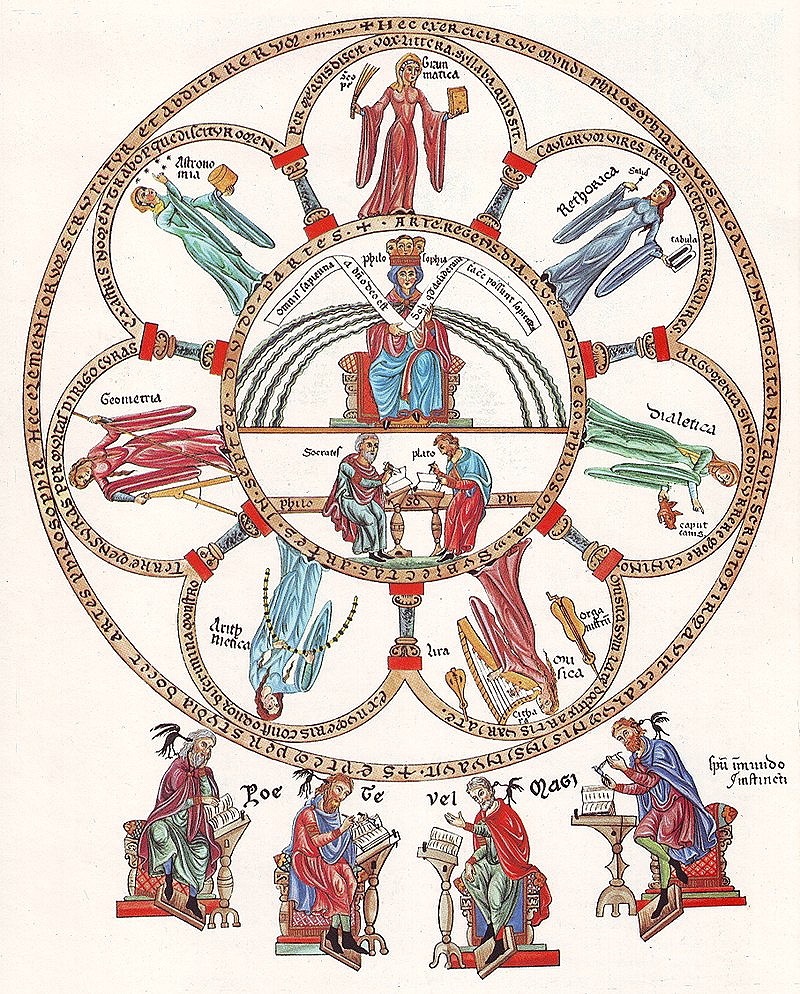
Philosophia et septem artes liberales, the seven liberal arts.
From the Hortus deliciarum of Herrad of Landsberg (12th century)
"When a leader pisses off their bureaucracy's Old Marys, they're posing for their own statuary; they're finished."
History seems inscribed with leaders' footprints, it's all Napoleon this and Hannibal that without properly acknowledging those who greased the gears of great revolution and, more significantly, the Pax Romanas separating upheavals. Those gear greasers came from the ranks of competent ministers, folks well out of history's limelight who designed, constructed, and maintained the vast bureaucracies which competently administered societies. We find no statuary commemorating the savvy minister, no steeples erected in fond memory of the geeks who broke only paper trails, no continents named after the genius who invented double-entry bookkeeping, but without them the touted leaders could not possibly have succeeded at anything. In our present time, with pandemic sweeping the globe, the scrupulous statisticians and hospital administrators have contributed more to containing the contagion than all the leaders proclaiming impotent dominion over it. Send me one Old Mary and I'll comfortably replace a Pentagon filled with Five Stars and a carrier fleet of sailors.
Back when The Muse worked in the property/casualty insurance industry, she interacted with many brokers and home office executives, but largely via their support staff, who typically reported to a matronly secretary who actually ran the operation, a role one broker referred to as "his Old Mary."
InappropriateMetaphor
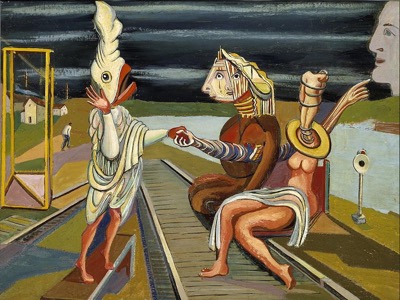
The Solidity of the Road to Metaphor and Memory, Misha Reznikoff, 1934
"Suffering might always be the lingering effect of innocently ineffective metaphoring."
InappropriateMetaphor is the root of all evil. It enables us to perceive difference where no meaningful difference exists. It ties us to self-destructive habits, encourages international conflicts, and might convince someone to build ineffective border walls. It fuels global warming, redlining, and urban blight. It encourages disposables which last for centuries. It fuels fear and institutionalizes ignorance. It justifies dominance when cooperation would better serve. It promotes tenacious inequality and bigotry, poverty and great wealth, debilitating sickness and declining health. It makes us crazy while passing for perfectly sane. It represents manners of living as if they were necessary imperatives. It poorly informs us.
Shifting metaphors might mend anything.
AsymptomaticSuperspreader

"Our walking shoes might finally be ready next Tuesday …"
I have come to presume that all people not wearing a mask in public are undiagnosed AsymptomaticSuperspreaders. I wear my mask to encumber my natural tendency toward AsymptomaticSuperspreading. Since I cannot definitively determine whether I'm carrying, I figure that we're all safer if I presume myself to be a dangerous presence. I know that I feel a whole lot safer when others presume the same about themselves. Sure, there's a chance that I won't immediately infect you if I don't wear my mask, but there's essentially zero chance if I do, so I take it upon myself to protect you. You're welcome. I do wonder why you don't feel compelled to protect me in return. Maybe you believe yourself not to be an AsymptomaticSuperspreader. This belief best preserves your innate ability to become one. Congratulations!
The Muse ordered the breakfast burritos the night before for pick-up at nine the following morning.
Breakout
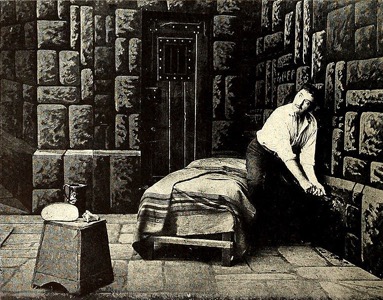
Film still of James O'Neill as Edmond Dantès in The Count of Monte Cristo, a 1913 film.
"I've decided to escape."
I've managed to master about ten percent of a writer's craft in that I seem to be able to write. Raw writing, though, might amount to no more than ten percent of the craft, the other ninety percent being related to all that happens after the writing's done. Editing's in that ninety percent, but so are all the activities related to distribution: promotion, publication, and, I suppose, personality, wherein the writer projects a more pubic persona. Simply writing's a fine occupation, though it pays no bills and without some broader distribution, realizes little reach and influences few; not that writing's only justified if it influences, for it's possible to restrict a writer's work to only influence the writer or just a few close acquaintances, but a broader presence seems essential to fulfilling a writer's potential. Writing's a share the wealth sort of enterprise.
Approaching, let alone mastering writing's tail end ninety percent has always been my dread, one of those activities I wouldn't mind having done, but seem to have no passion for actually doing.
Timemorelessness
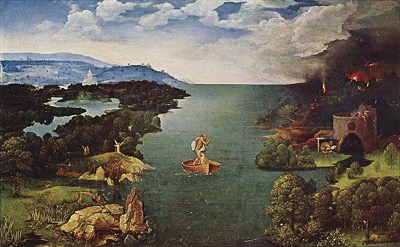
Joachim Patinir: Landscape with Charon Crossing the Styx, 1515-1524
" … we'll claim to have been there then without actually having understood anything."
We usually define time as finite, a steadily regulating entity, drawing the baseline cadence of our lives, at least in ordinary times. But we live in extraordinary times, beneficiaries of that ancient Chinese curse, so our time proceeds much more erratically. Some days constrain every effort while others seem to expand before us like a vast ocean stretching far beyond the visible or even any imaginable horizon, essentially black holes absorbing every expectation. I cannot fill these immense days, which expand time into unexpendable excess to produce the opposite of feelings of being pressed for time. Time moves languidly then, without harassing drop dead deadlines, hardly seeming like time at all. A Timemorelessness settles in, not needing management or optimization, for it seems an infinite good aching to be what more constraining times might insist upon labeling wasted, but one cannot waste Timemorelessness, like one cannot ever squander any infinite, for expending any portion of it seems to reduce the remaining only insignificantly.
I become a time Midas those days, where everything I touch turns into even more potential, rendering closure meaningless.
Esteem-ating

Study for Nymphs Finding the Head of Orpheus, John William Waterhouse, 1900
" … and not peer darkly into any glass."
We tend to peer into the glass brightly, always perceiving better ahead. Our self-esteem seems to rely upon this curious facility, as if darker visions might utterly destroy us. Those who project more pessimistically attract few followers, for they seem simply grumbly, suffering from some form of depressive disorder. Speaking truth to power first requires speaking truth to one's self, and few selves seem very interested in anything like the truth. We want the princess to marry the prince, which recently transformed from a toad, and live happily ever after because we'd prefer to live happily ever after, too. We first seek reassurance. The depths of deflecting denial seem just as infinite as the heights of our hopefulness. A No-Man's Land stands between these defensive barricades.
In mid-April, the US suffered the equivalent of a D-Day invasion's number of dead every two days, an unimaginable volume, even in retrospect.
Poelease
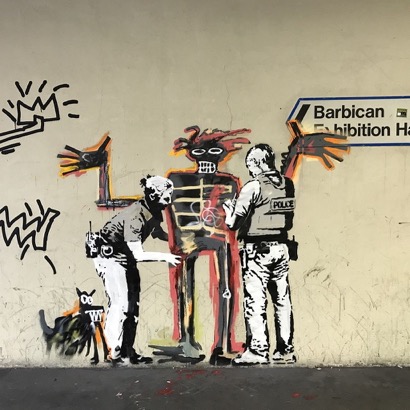
Basquiat being “stopped-and-frisked” outside the Barbican Centre, Banksy, 2017
"I still fully expect to be harassed if not arrested with every encounter …"
Every child of the sixties learned to distrust the cops. We were at constant risk of arrest, whether from simple possession or even simpler teenage passion, the cops seen as at best spoil sports and at worst voyeurs and vindictives. We maintained vigilance, a practice which left some life-long paranoids. We'd each seen plenty of swaggering cops playing the tough guy but only very rarely encountered a compassionate one. We each expected to be run in for some inadvertent infraction before we'd graduated high school, as we practiced a clandestine, fatalistic form of civil disobedience as a simple matter of existence. We weren't bad kids, but we were at continual risk of arrest, prosecution, and incarceration. These experiences formed a conviction that the Poelease were not, as Jack Web's Dragnet insisted, present "to protect and serve," but to harass and punish, an occupying force representing the forces of hypocritical Republicans. It mattered who you knew.
A friend and I were once arrested for the presumed crime of wading in a park fountain we'd both been wading in since we were small children, the arresting officer impatiently explaining that only little kids were supposed to wade in it.
Longhair

Samson and Delilah, by Gustave Doré, c. 1860
"I'll recognize ordinary time when I see it looking back at me from my mirror again."
Since the age of twenty-five, my head has served as my chronometer, its finest granularity being the month, roughly the distance between haircuts. My face accurately measures time in days. My mustache, in fortnights, the time between necessary trims. Before the shutdown, I remained groomed as regularly as any clock works. Since, even my shaving's slipped to every other morning, often every third or even a previously thinkable fourth. My hair's gone feral, over my ears and curling along the back. I feel on track to return to my early twenties' self, frizzy pony tail dangling halfway down my back, tied behind my head with a thin rawhide strap. I for years contended that I carried the Sampson gene. Any deceitful Deliah carrying scissors could thwart my power, such as it was. I long lusted after long hair and maintained it with a reverence exceeding religious conviction. I didn't just have long hair or wear my hair long, I WAS a longhair.
Being a longhair qualified as an identity then, a Good Housekeeping Seal of Approval of a certified Age Of Aquarian within.
RecoveringGuru

Adi Shankara with Disciples, by Raja Ravi Varma (1904)
"I make my own noise without hoping to change anyone's world but mine."
Looking at me now, you might never imagine that I was once considered to be a guru of sorts, for I was a designated thought leader and workshop teacher, and the guru designation just seems to come with that territory. As a veteran of the sixties coffeehouse music culture, I was certainly no stranger to the stage. I would balance on the three-legged high stool on the platform overlooking the place and perform my latest song to the largely distracted assembly, hoping to catch an eye, praying to be recognized, just as has every other budding singer/songwriter in the history of the world so far. That stage was never subsequently swarmed by entranced females, but I'd usually gain a heart-felt appreciation or two. Once I started consulting and teaching for real, the relationships became increasingly curious. Because I had been present, holding forth, personal insights participants experienced might end up somehow attributed to me, as if I had induced them, and maybe I had. Heartfelt appreciations sometimes became indistinguishable from veiled seductions. I was largely unaware, though home life could get complicated by a curious voicemail left for me but picked up by my spouse. Then some explaining would commence.
The cult of celebrity, even of local notoriety, did not reassure me.
ImaginaryEnemies

Crítica, engraving by Julio Ruelas, ca. 1907
" … hope springs intermittently, never seamlessly or continuously."
As society seems to crumble, live on the six o'clock news, I feel mostly moved to tap the snooze alarm. The broadcasts seem to need to cast their full color video in shadowy blacks and whites, a palette hardly suitable for representing any underlying complexity. It seems to be us versus them again in never-ending conflict. The simplicity imbedded within the storyline unfamiliar to anyone experienced in any sort of real world relationship. These seem soap opera representations, where human relations distill down to the color of a character's hat and the soundtrack's sinister tone. We each maintain our caricature characterizations of those we imagine to be our mortal enemies, mostly without ever having had the pleasure of their physical company. We remain willfully ignorant of others' intentions, if only because our fictions might prove unbelievable should they stray too far into self-contradiction. We hate more easily than we love, often holding ourselves hostage awaiting another's extension of an appreciation we ourselves withhold. There might well be far fewer bad actors than really bad plays, lines proposed to maintain a seemingly necessary simplicity, lest we grow too confused.
I watched a poorly masked so-called protestor paint graffiti on an innocently by-standing tree in the park adjacent to the statehouse this week.
Cascade

Destruction of the Tower of Babel by Crispijn de Passe the Elder Netherlandish, 1612:
at right men and women flee from the burning tower, at left men and women raise their hands toward two flying angels,
from a series of engravings made for the first edition of the 'Liber Genesis'
"Once prosperous farmers, they moved into a crooked little house in town to live out their days after the Cascade."
The great Cascade has already started, though the full flood has yet to reach many. Starbucks has requested twelve months of rent 'consideration' after not paying rents for the prior two months. Nearly half of the commercial enterprises in this country missed rent payments in April and May, and we're still in very early stages of this particular pandemic. This sort of situation marks only the beginning of a cascade of shortfalls, where landlords, mortgage holders, and property managers start to lose their usual inflows of cash. Insurances and other services follow soon after, with nothing left to even pay the cleaning staff and the garbage men. A building can go derelict after a few remarkably short months. The blood extraction units take over half the turnip patches as the lawyers get involved.
Prosperity has yet to be shown to trickle down, but austerity certainly does, though its trickle easily becomes a Cascade. It also trickles up.
Thinnest
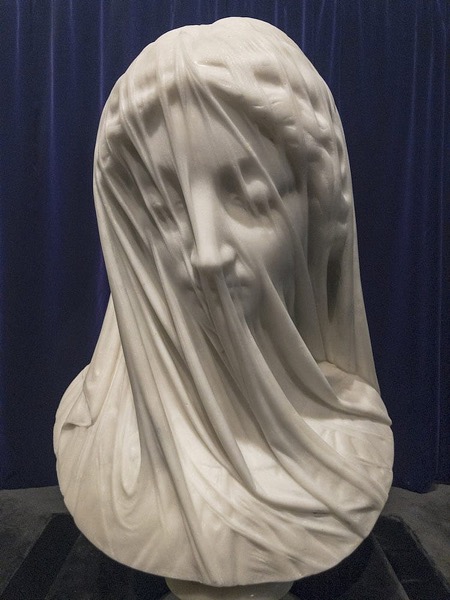
"The Veiled Virgin,” Giovanni Strazza, ca. 1850s
"We inhabit a poor country, one whitewashed over blistered base coat."
Read any history of These United States and you'll learn that we've never been quite as united as we publicly purported ourselves to be. We project our stories out onto a frequently disbelieving world, for the world often sees right through our veil to perceive the underlying dishonesty and naiveté. We believe, after a fashion, though that fashion seems the very Thinnest imaginable fabric. We've mostly preferred to look good over doing genuine good, with self-interest a frequent companion. The recovery from the 2008 market crash produced a predictably thin result, with the bulk of the recovery focused upon repairing the veil, producing another remarkably thin result; perhaps the Thinnest ever. Employment rose to record levels, but so did the number of absolute bullshit jobs and scutty gig work, usually without benefits, providing only a distant appearance of prosperity. A puff of adverse breeze quickly brought down to their knees those inhabiting that house of cards.
Our pandemic defenses, too, were cardboard constructions, long starved of resources in favor of flashier uses.
ThePandemicParadox

Rage, Flower Thrower, by Banksy, painted on a wall of a gas station in the West Bank city of Bethlehem, Palestine
"Even the most powerful people on this planet cannot influence the velocity of fate."
This Pandemic seems to have promoted paradox into fresh prominence. Paradoxes shred conventional problem-solving by presenting conditions not immediately conducive to understanding or resolution. They remain mysterious and above all tricky. This one does not crisply respond to even the more well-intended interventions. Our scientists seem uncommonly wise for initially prescribing strategic retreat. Politicians predictably embraced full frontal assaults, if only to preserve the useful fiction that they were in charge, a strategy doomed to fail. The more powerful you pretend to be against a pandemic, the weaker you eventually seem. Scream all you want, offensive speech and derisive action will not succeed. Conquering paradoxes demands a certain subtlety.
Responding to any emergency with patient inquiry seems so counter-intuitive as to feel like most certainly the wrong approach.
Bookish
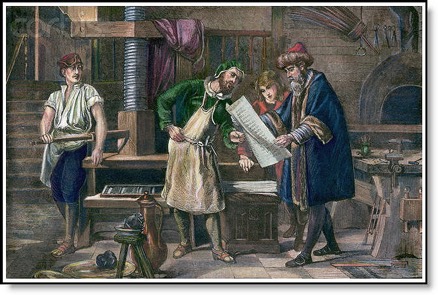
Gutenberg: Colored engraving created in about the 19th century. Artist unknown. Source: Bettman-Corbis reproductions
"I never feel wealthier than when I'm carrying a fresh pile of found books out the front portal of my local library."
I identify as Bookish in the same way that some identify as Jewish. This seems largely a genetic inheritance combined with a cultural tradition. Bookishness carries deep obligation along with certain evolving rituals, tradition compounded through diligent practice. My shelves overflow with treasured artifacts, reminders of theres and thens, wheres and whens from my past. My social and spiritual evolution seems catalogued in my library, each volume a memory of a specific place in time, most holding some residue of satisfaction or insight, though I retain a few there out of possible spite, for I have through books maintained an inner dialogue, a dialectic inquiry into the vast variety and novelty of this life, little of which I feel properly positioned to personally experience. I've despised some of this. My library and my much broader catalogue came to more than merely inform me, but to define who I've come to become. My education ongoing, settling little to nothing, yet the dialogue/monologue continues.
I read much more than I write, and might most properly identify myself more as a reader than as a writer, though few accept reader as an identity or a profession, for it pays nothing but dividends, no cash incomes.


